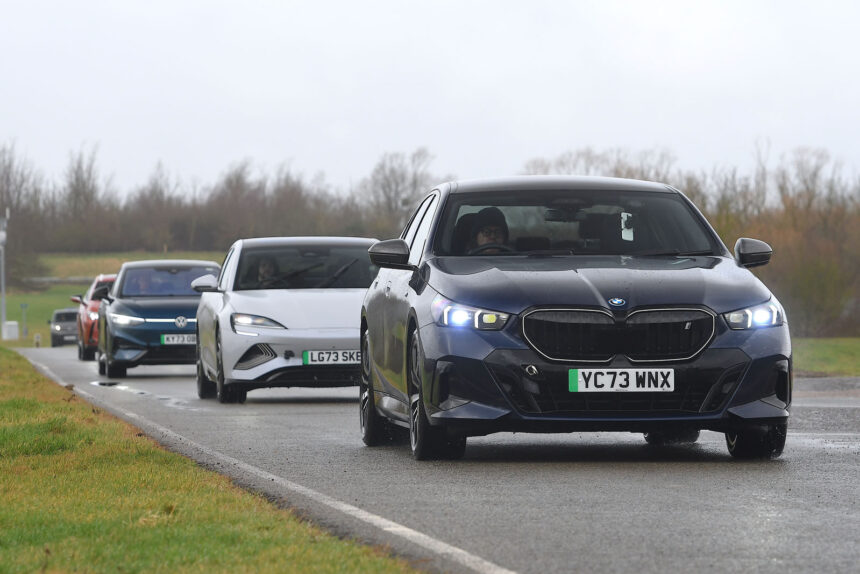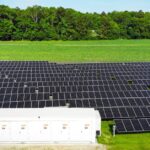The electric car industry is on the cusp of a major breakthrough in efficiency, with manufacturers pushing the boundaries to achieve a transformative goal of 5.0 miles per kilowatt hour (mpkWh). This figure is crucial because it directly translates to increased battery range, with a difference of 50 miles for a typical 50kWh battery pack.
Several companies are already racing to be the first to achieve this milestone. Lucid claimed the title with its Air Pure saloon, while Mercedes recorded an impressive 5.2mpkWh with a prototype of the upcoming CLA model. These achievements may seem incremental, but they require a significant amount of engineering prowess and attention to detail.
One of the key areas of focus in achieving 5.0mpkWh is aerodynamics. Wind resistance accounts for a significant portion of energy consumption at higher speeds, prompting manufacturers to invest in wind tunnels and simulations to reduce drag. Hyundai, for example, has achieved a commendable 0.21 Cd with its Ioniq 6 model.
Heating, ventilation, and air conditioning (HVAC) also play a crucial role in energy efficiency, accounting for a substantial drain on the battery. By prioritizing the heating of seats and steering wheels over full cabin conditioning and adopting heat pumps that harvest waste heat, manufacturers can significantly improve efficiency.
Reducing vehicle weight and optimizing battery regeneration are other important factors in improving energy consumption. Every 100kg saved can result in a 2% reduction in energy consumption on the highway and up to 5% in city driving.
Additionally, the choice of tires and brakes can have a significant impact on efficiency, especially at lower speeds where they account for a larger proportion of energy consumption. Low-rolling-resistance tires and active management of brake drag can help minimize these losses.
Other areas of focus include optimizing lighting and wiper systems, as well as advancing battery technology, inverters, power electronics, and motors. While improvements in these components may not yield significant gains in efficiency, they are essential for overall performance and longevity.
In the quest for 5.0mpkWh, manufacturers are pursuing a series of marginal gains across various aspects of the vehicle to achieve the desired efficiency. Real-world efficiency may vary from laboratory tests, with factors like air conditioning usage having a significant impact.
Ultimately, hitting the 5.0mpkWh target will require a comprehensive approach that addresses all aspects of vehicle design and operation. As technology continues to evolve, advancements in areas like solid-state batteries and AI self-driving systems may further improve efficiency in the long run.
The electric car industry is at an exciting juncture, with manufacturers pushing the boundaries of efficiency to deliver vehicles that offer greater range and sustainability. By focusing on key areas like aerodynamics, HVAC, weight reduction, and component optimization, the race to achieve 5.0mpkWh is well underway. The world of technology is constantly evolving, with new innovations and advancements being made every day. From artificial intelligence to virtual reality, there is no shortage of exciting developments happening in the tech industry. One of the most recent trends that has been gaining traction is the use of blockchain technology.
Blockchain technology is a decentralized, distributed ledger that records transactions across multiple computers. This technology is most commonly associated with cryptocurrencies like Bitcoin, but its applications go far beyond just digital currencies. Blockchain has the potential to revolutionize a wide range of industries, from finance to healthcare to supply chain management.
One of the key benefits of blockchain technology is its transparency and security. Because the ledger is distributed across multiple computers, it is extremely difficult for any single entity to manipulate or alter the data. This makes blockchain an ideal solution for industries that require high levels of security and trust, such as financial services.
In the finance industry, blockchain technology is already being used to streamline processes and reduce costs. Banks and financial institutions are exploring the use of blockchain for cross-border payments, trade finance, and securities trading. By using blockchain technology, these institutions can eliminate the need for intermediaries and reduce the risk of fraud.
In the healthcare industry, blockchain technology has the potential to improve data security and patient privacy. Medical records stored on a blockchain are encrypted and can only be accessed by authorized parties, making it much more difficult for hackers to steal sensitive information. Additionally, blockchain can help streamline the sharing of medical records between healthcare providers, reducing the risk of errors and improving patient care.
In the supply chain industry, blockchain technology can help track the movement of goods and ensure their authenticity. By recording each step of the supply chain on a blockchain, companies can verify the origin of products and ensure they are not counterfeit. This can help reduce fraud and improve the trustworthiness of products in the market.
Overall, blockchain technology has the potential to revolutionize a wide range of industries and improve efficiency, transparency, and security. As more companies and organizations adopt this technology, we can expect to see even more exciting developments in the future. Keep an eye on blockchain technology – it’s set to change the world as we know it.







